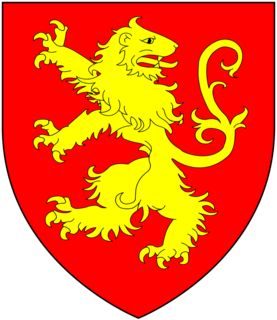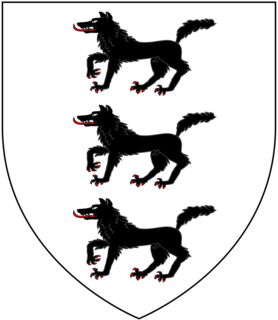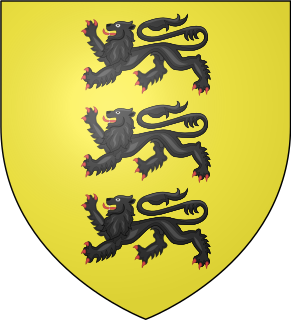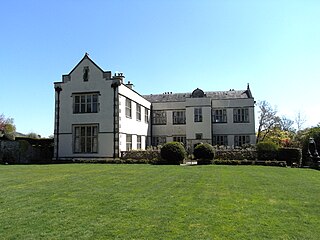
John Bampfylde of Hestercombe in Somerset, was an English landowner and politician who sat in the House of Commons between 1715 and 1741.

The Chaytor family is an English gentry family on which has been conferred two baronetcies, one in the Baronetage of England and one in the Baronetage of the United Kingdom and several knighthoods. As of 2008 one baronetcy is extinct.

The Morice Baronetcy, of Werrington in the County of Devon, was a title in the Baronetage of England.

The Carr Baronetcy, of Sleaford in the County of Lincolnshire, is a title in the Baronetage of England. It was created on 29 June 1611 for Edward Carr who was Sheriff of Lincolnshire in 1614. The 3rd Baronet was Member of Parliament for Lincolnshire in the House of Commons.

Sir Coplestone Bampfylde, 2nd Baronet of Poltimore and North Molton and Warleigh, Tamerton Foliot, in Devon, was an English politician who sat in the House of Commons at various times between 1659 and 1689.
Sir William Villiers, 3rd Baronet was an English politician from the Villiers family.
The Firebrace Baronetcy, of London, was a title in the Baronetage of England. It was created on 28 July 1698 for Basil Firebrace, Member of Parliament for Chippenham from 1690 to 1692. He was the son of Sir Henry Firebrace. The third Baronet sat as Member of Parliament for Suffolk. The title became extinct on his death in 1759.

The Lovett Baronetcy, of Liscombe House in the County of Buckingham, was a title in the Baronetage of Great Britain. It was created on 23 October 1781 for Jonathan Lovett of Liscombe in the parish of Soulbury, Buckinghamshire. He was subsequently offered a peerage but declined, on the grounds that his only son had died. Lovett married Sarah Darby, but died in 1812 without surviving male issue, his son Robert Turville Jonathan Lovett having pre-deceseased him in 1807, and thus the title became extinct.

Sir John Carew, 3rd Baronet of Antony, Cornwall, was an English politician who sat in the House of Commons variously between 1660 and 1692.

Sir John Fowell, 2nd Baronet of Fowelscombe in the parish of Ugborough in Devon, was thrice elected a Member of Parliament for Ashburton in Devon, between 1659 and 1677. He fought in the Parliamentary army during the Civil War and following the Restoration of the Monarchy was appointed in 1666 by King Charles II Vice-Admiral of Devon.

Sir Edmund Fowell, 1st Baronet of Fowelscombe in the parish of Ugborough in Devon, was a Member of Parliament for Ashburton in Devon from 1640 to 1648.

Sir John Fowell, 3rd Baronet of Fowelscombe in the parish of Ugborough in Devon, was an English politician who sat in the House of Commons from 1689 to 1692.
Sir Edmund Denton, 1st Baronet, of Hillesden, Buckinghamshire, was an English Whig politician who sat in the English and British House of Commons from 1698 to 1713.

Sir Hugh Pollard, 2nd Baronet was an English soldier and MP elected for Bere Alston in 1640, Callington in 1660, and Devon in 1661. He supported the Royalist cause in the English Civil War.

Fowelscombe is a historic manor in the parish of Ugborough in Devon, England. The large ancient manor house known as Fowelscombe House survives only as an ivy-covered "romantic ruin" overgrown by trees and nettles, situated 1 mile south-east of the village of Ugborough. The ruins are a Grade II listed building.

Sir Edmund Prideaux, 1st Baronet (1554–1628), of Netherton in the parish of Farway, Devon, was a Councellor at Law and Double Reader of the Inner Temple and was created a baronet on 17 July 1622. He purchased the estate of Netherton where in 1607 he built a new mansion house, known today as Netherton Hall, a grade II listed building. He was one of John Prince's Worthies of Devon.

Jonathan Rashleigh (1642–1702) of Menabilly, near Fowey, Cornwall was Sheriff of Cornwall in 1686/87, and twice MP for Fowey 1675–1681 and 1689–1695. His portrait exists at Antony House, Torpoint, Cornwall, formerly the home of his second wife Sarah Carew.

Netherton in the parish of Farway in Devon is an historic estate situated about 3 1/2 miles south-east of Honiton. The present mansion house known as Netherton Hall was built in 1607 in the Jacobean style, restored and rebuilt 1836-44, and is a Grade II listed building.
Sir Nathaniel Napier, 3rd Baronet, of Moor Crichel, Dorset, was an English landowner and politician who sat in the English House of Commons from 1695 to 1708 and in the British House of Commons from 1710 to 1722.

Sir William Carew, 5th Baronet was a British politician who sat in the House of Commons from 1711 to 1744.













